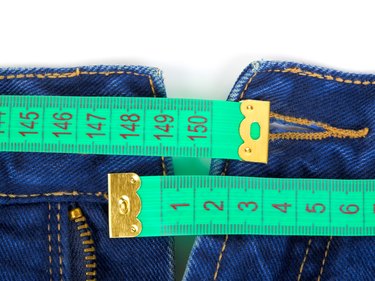
Your gallbladder is a small organ near your liver that releases bile, a digestive fluid, into your bile duct, which supplies it to the small intestine. If you lose weight quickly or have other risk factors, you may experience gallstones, small pieces of hardened material that can block the flow of bile and cause pain and other symptoms.
Risk Factors
Video of the Day
One risk factor for developing gallbladder problems is rapid weight loss. As your body burns fat quickly, some of the cholesterol in the liver seeps into the bile, which can cause cholesterol gallstones. You can develop gallstones if you lose and gain weight repeatedly. Other risk factors include a diet high in fat and cholesterol, family history and a diagnosis of diabetes. People over the age of 60 are more likely to develop gallstones, as are women and those taking cholesterol-lowering medications.
Video of the Day
Prevention
To try to prevent gallstones, lose weight slowly and avoid crash diets and fasting. A reasonable weight loss goal is 1 to 2 lbs. per week. If you have overweight or obesity, you should try to lose weight, since obesity also is a risk factor for developing gallstones. Eat a balanced diet that is not high in fat or cholesterol, and try to exercise each day. Don't skip meals, as this may cause gallstones if you are susceptible.
Symptoms
As gallstones move into the bile duct, you may experience a "gallbladder attack." Symptoms include a steady pain in the upper right abdomen, between the shoulder blades or under your right shoulder. The pain usually comes on suddenly and may last for several hours. If you experience this pain along with a fever, chills, yellow eyes or skin, clay-colored stools or vomiting, or if the pain lasts longer than five hours, seek emergency care. Otherwise, contact your doctor as soon as reasonably possible for an evaluation.
Treatments
If you have problems with your gallbladder, your doctor may recommend a cholecystectomy -- a surgical procedure to remove the gallbladder. This is a common operation to relieve symptoms. In some cases, removing your gallbladder may cause persistent diarrhea. Another treatment option is to take medication to dissolve the gallstones. This is usually reserved for those who cannot tolerate the surgery because of heart problems or general poor health. It can take months or even years to successfully eliminate the gallstones in this treatment.